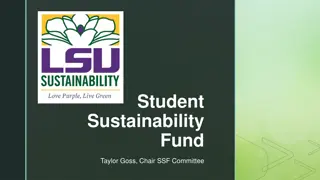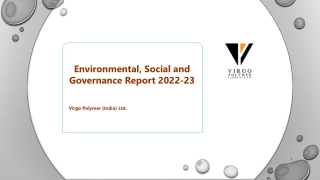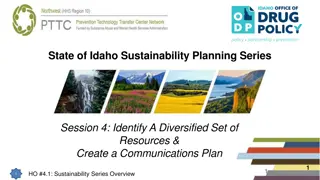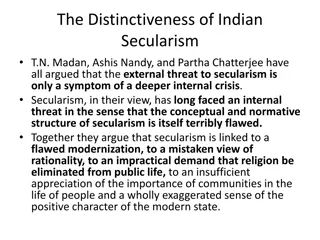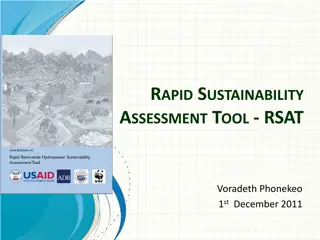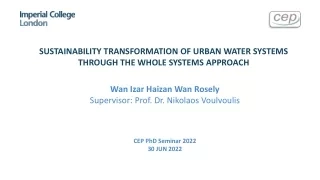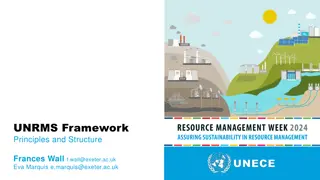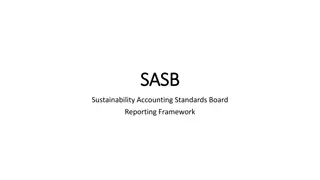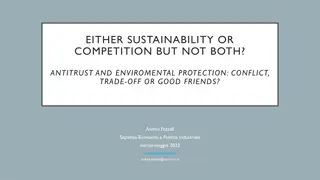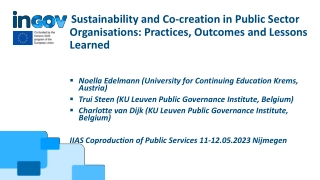Sustainability Practices in Indian Hotels: A Website Analysis
This study explores the level of commitment of five and four-star hotels in India towards sustainability practices by analyzing their websites. It examines if hotels provide information on sustainability practices, have a sustainability management plan accessible to outsiders, and incorporate environmental concerns in their promotional material. The research aims to understand the impact of hotels on the environment and assess their adherence to Ministry of Tourism guidelines.
Download Presentation

Please find below an Image/Link to download the presentation.
The content on the website is provided AS IS for your information and personal use only. It may not be sold, licensed, or shared on other websites without obtaining consent from the author. Download presentation by click this link. If you encounter any issues during the download, it is possible that the publisher has removed the file from their server.
E N D
Presentation Transcript
DISCLOSURE OF SUSTAINABILITY PRACTICES BY INDIAN HOTELS Dr.Tahir Sufi, Professor & Deputy Director, Amity School of Hospitality, Amity University, Noida, India
INTRODUCTION The tourism development brings many problems like noise, air, water pollution, overbuilding and exploitation of natural resources , in spite of the long list of benefits. An average hotel releases between 160-200 Kg of carbon dioxide per square meter of room floor area per year, water consumption per night per guest is between 170-440 lts in a five-star hotel (Sloan, Legrand and Chen, 2009). Many hotels in India have taken numerous initiatives recognizing the importance of sustainability and responsible tourism. General guidelines for the accommodation sector laid out by Ministry of Tourism
The guidelines include: No objection certificate from pollution control board 1. Steps to ensure conservation of energy 2. Water harvesting 3. Garbage segregation 4. Disposal and recycling gas per the norms of pollution control board. 5. Sewage water treatment, 6. Pollution control methods for air water and light. 7. Introduction to the non-CFC refrigeration system. 8.
Recommended Guidelines for disclosure Hotel practices. website to provide information about the sustainability Hotel websites to have a sustainability management plan that includes sections of (environmental, socio-cultural, health, safety, quality control and local community participation) that are accessible to outsiders? Websites with the hotel promotional literature on website to incorporate the environmental concern?
RESEARCH PROBLEM This study analyses the websites of understand the level of commitment of such hotels towards sustainability practices keeping in consideration the level of damage the hotels cause to environment. five and four-star hotels of India to
METHODOLOGY Through random sampling method, this study examined the fifty websites of the five-star and five-star deluxe hotels of India. The websites were content analyzed to check the recommended disclosure practices recommended by Ministry of Tourism Does the hotel website provide information about the sustainability practices? 1. Does the hotel have a sustainability management plan that includes sections of (environmental, socio-cultural, health, safety, quality control and local community participation) that are accessible to outsiders? 2. 3. Does the hotel promotional literature on website incorporate the environmental concern?
Methodology This study examined the fifty websites of India's 5-star deluxe hotels. . The hotels were chosen based on the random sampling method. There are about two hundred seventy-five-star and five-star deluxe hotels in India. The sample represents about twenty percent of such hotels. The reason why only five- star and five-star deluxe hotel chains were chosen for study is that luxury hotel chains are supposed to behave more responsibly towards the issues of social responsibility. Content analysis was used to extract information about the hotel'shotel's policies and practices of sustainability.
SAMPLE SIZE This study examines one hundred hotels, including fifty-five-star hotels and fifty-five- star hotels. This represents 18% of a sample size of five-star and 41% of four-star hotels. These hotels were chosen through a random sampling method from the database of classified hotels that is available on the website of the Ministry of Tourism. A content analysis technique was used to review the web pages of the selected hotels( especially the sections related to environmental sustainability ).
CONCLUSION In case of five star hotels only eleven out of fifty hotels (22%) websites provide information about the sustainability practices of the hotels. These hotels also have a written plan about environmental, socio-cultural, health, safety, quality control and local community participation. Only five hotels (10%) have a plan for involving the local community also in sustainability related initiatives to spread awareness about such issues.
Conclusion - continued For most hotels, the concept of sustainability means energy conservation only for a reduced expenditure. In the case of the five-star hotels that have uploaded the sustainability plans on the website, all of these hotels have well-written energy conservation plans. Five hotels plan to involve the local community in sustainability-related initiatives to spread awareness about such issues. Ten hotels (20%) out of a list of fifty hotels have plans of sustainability incorporated in the promotional brochure.
Conclusion - continued Five-star hotels are expected to be more responsible in the area of sustainability because of rigorous cleaning standards that result in excessive chemicals. The guests also regularly change linen resulting in the massive use of laundry chemicals and excessive electricity use. The low percentage of hotels taking sustainability seriously is that these guidelines are not mandatory.In the case of four-star hotels, only four out of fifty have sustainability information on the website. The same hotels have a documented plan for sustainability. These hotels, as expected, focus on energy conservation mainly. These hotels also focus on other sustainability aspects like using eco-friendly products, community engagement, and practices for reducing air, noise, and water pollution. Only two out of fifty hotels convey the concern related to sustainability in the promotional material.
FOUR STAR HOTELS Only four hotels ( 8%) out fifty have a sustainability information displayed on the website. These same hotels have a documented plan for sustainability. These hotels as expected focus on energy conservation mainly. These hotels also focus on other aspects of sustainability like use of eco-friendly products, community engagement, practices for reducing the air, noise and water pollution. Only two out of fifty hotels(4%) convey the concern related to sustainability in the promotional material.
DISCUSSION -RECOMMENDATIONS Eco hotels on the other hand, take the issue of sustainability more seriously . Almost all such hotels have a complete information about sustainability practices on website. High star rated hotels therefore need to learn best practices of sustainability from Eco Hotels. This study recommends that hotel classification process of India to be more rigorous in sustainability practices.
Discussion Five-star hotels are expected to be more responsible in the area of sustainability on account of rigorous cleaning standards that results in the use of excessive chemicals. The guests also regularly change linen resulting in the massive use of laundry chemicals and excessive use of electricity. Keeping all these issues in consideration, it is imperative that due consideration is given to the sustainability. The possible reasons for the low percentage of hotels taking sustainability seriously are that these guidelines are not mandatory for hotels.





